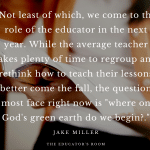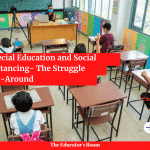A neighbor complains every time it snows. It doesn’t matter if it’s a feathery amount or a foot — to him, the impediment of snow is too much to handle. He hates the shoveling. He hates the noise of the snowblowers. He hates driving in it. He hates the cold. He hates teleworking. The list of things on his hate list is seemingly endless.
And as I listened to him chirp this year about the snow we just received, I came to a sudden realization and an SAT comparative problem — Snow: Neighbor:: Pandemic: Us.
Living in 2020 is horrific. I have friends who own small businesses who look at their income and expenses every day and worry how they’ll get by. Our social structure is completely upended, and we long for the day when we can just gather our friends and family for a real birthday party. Or, dare I say it, an in-person staff meeting. Of course, the biggest devastation of the disease is on those we love who have contracted the virus, and those we lost because of it.
This year is heavy as an iron plate painfully placed across both of our shoulders, and in it we need to find a sense of levity. And looking forward doesn’t offer it, so, instead, what if we looked back. I don’t mean look back to 2019; instead, what if we looked back to the wisdom of the Stoics.
I’m not talking about your stoic Uncle Nicky who fought in Vietnam and refuses to talk about that or anything but Notre Dame football and Jack Daniels. I’m talking about Roman philosophers like Marcus Aurelius, Seneca, and Epictetus who simply stopped and found ways to be happy despite what was going on around them.
[bctt tweet=”Before you stop me and say, “well they aren’t living what we’re going through right now,” I’ll respond with a simple declaration: “you’re right — in many ways, it was worse.”” username=””]
You see, Marcus Aurelius lost his co-ruler Lucius Verius at the beginning of the Antonin Plague, and it lasted for 15 years and killed 5 million people, which was approximately 33% of the Roman population.
And yet even in the crosshairs of death and despair, Marcus Aurelius’s inner-thoughts, in what is now his famous book of Meditations which he wrote for seemingly no one other than himself, contain nuggets of wisdom such as:
To live each day as though one’s last, never flustered, never apathetic, never attitudinizing – here is the perfection of character.
NPR’s Hidden Brain podcast recently had an episode titled “Minimizing Pain, Maximizing Joy.” And I cannot stop thinking about one quote from author William Irvine, author of The Stoic Challenge and guest on the episode, he reminds us of an inner-mantra he lives by every day:
Life is not about winning and losing – it’s about doing what you can… with what you have… where you are.
That’s it. That’s freedom from our own suffering.
In Stephen Covey’s highly-lauded 7 Habits of Highly Successful People, the author notes something I have had to remind myself of one thing over and again during this shutdown and accompanying devastation. What makes us human and not an animal is the notion that in between stimulus and response, we possess choice in our actions.
When it snows we have a choice to see it as a bother or as a blessing. For it is not the snow that weighs heavy on our hearts. Instead, it is our perspective of it. It is, no less, how we deal with it.
And, eventually, we won’t have days that are blessings or bothers, because one day, whether good or bad, will be our last. That’s why websites like DailyStoic.com sell coins with the famous Stoic slogan “Memento Mori” (remember you will die) is not bowing to death and despair, but instead accepting it and pursuing happiness and heart.
Find that in your days of this school year. It is far from perfect, but in accepting those imperfections, you can do what you can… where you are… with what you have, and you might not be able to move mountains, but you will inspire your students to be better versions of themselves. And if you can’t, that’s quite okay, too. Just do your best and stop competing with yourself, your colleagues, and last year when there were snow days as a respite.
As for me, I don’t complain about the snow. I appreciate its beauty. I love playing with my kids in it and sledding down the hill in our neighborhood. I am grateful for the workout and for helping neighbors. I love the stinging cold that is wrought by the hearth of our fireplace a warm cup of hot chocolate. Because that’s what a Stoic would do.






